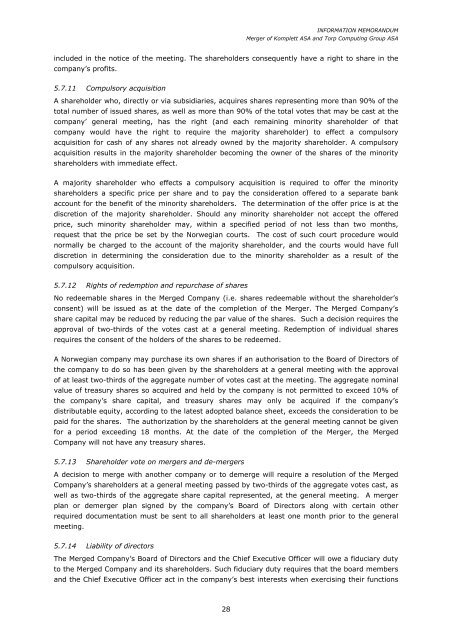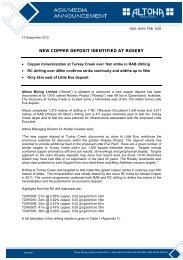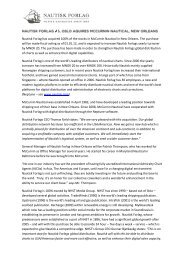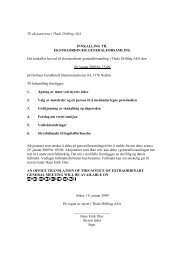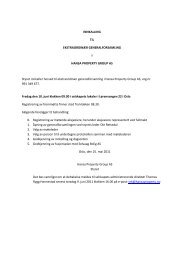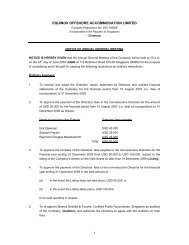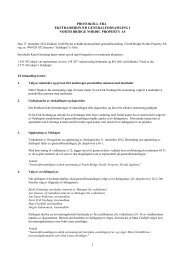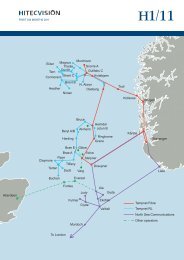Torp Computing Group ASA
Torp Computing Group ASA
Torp Computing Group ASA
Create successful ePaper yourself
Turn your PDF publications into a flip-book with our unique Google optimized e-Paper software.
28<br />
INFORMATION MEMORANDUM<br />
Merger of Komplett <strong>ASA</strong> and <strong>Torp</strong> <strong>Computing</strong> <strong>Group</strong> <strong>ASA</strong><br />
included in the notice of the meeting. The shareholders consequently have a right to share in the<br />
company’s profits.<br />
5.7.11 Compulsory acquisition<br />
A shareholder who, directly or via subsidiaries, acquires shares representing more than 90% of the<br />
total number of issued shares, as well as more than 90% of the total votes that may be cast at the<br />
company’ general meeting, has the right (and each remaining minority shareholder of that<br />
company would have the right to require the majority shareholder) to effect a compulsory<br />
acquisition for cash of any shares not already owned by the majority shareholder. A compulsory<br />
acquisition results in the majority shareholder becoming the owner of the shares of the minority<br />
shareholders with immediate effect.<br />
A majority shareholder who effects a compulsory acquisition is required to offer the minority<br />
shareholders a specific price per share and to pay the consideration offered to a separate bank<br />
account for the benefit of the minority shareholders. The determination of the offer price is at the<br />
discretion of the majority shareholder. Should any minority shareholder not accept the offered<br />
price, such minority shareholder may, within a specified period of not less than two months,<br />
request that the price be set by the Norwegian courts. The cost of such court procedure would<br />
normally be charged to the account of the majority shareholder, and the courts would have full<br />
discretion in determining the consideration due to the minority shareholder as a result of the<br />
compulsory acquisition.<br />
5.7.12 Rights of redemption and repurchase of shares<br />
No redeemable shares in the Merged Company (i.e. shares redeemable without the shareholder’s<br />
consent) will be issued as at the date of the completion of the Merger. The Merged Company’s<br />
share capital may be reduced by reducing the par value of the shares. Such a decision requires the<br />
approval of two-thirds of the votes cast at a general meeting. Redemption of individual shares<br />
requires the consent of the holders of the shares to be redeemed.<br />
A Norwegian company may purchase its own shares if an authorisation to the Board of Directors of<br />
the company to do so has been given by the shareholders at a general meeting with the approval<br />
of at least two-thirds of the aggregate number of votes cast at the meeting. The aggregate nominal<br />
value of treasury shares so acquired and held by the company is not permitted to exceed 10% of<br />
the company’s share capital, and treasury shares may only be acquired if the company’s<br />
distributable equity, according to the latest adopted balance sheet, exceeds the consideration to be<br />
paid for the shares. The authorization by the shareholders at the general meeting cannot be given<br />
for a period exceeding 18 months. At the date of the completion of the Merger, the Merged<br />
Company will not have any treasury shares.<br />
5.7.13 Shareholder vote on mergers and de-mergers<br />
A decision to merge with another company or to demerge will require a resolution of the Merged<br />
Company’s shareholders at a general meeting passed by two-thirds of the aggregate votes cast, as<br />
well as two-thirds of the aggregate share capital represented, at the general meeting. A merger<br />
plan or demerger plan signed by the company’s Board of Directors along with certain other<br />
required documentation must be sent to all shareholders at least one month prior to the general<br />
meeting.<br />
5.7.14 Liability of directors<br />
The Merged Company’s Board of Directors and the Chief Executive Officer will owe a fiduciary duty<br />
to the Merged Company and its shareholders. Such fiduciary duty requires that the board members<br />
and the Chief Executive Officer act in the company’s best interests when exercising their functions


